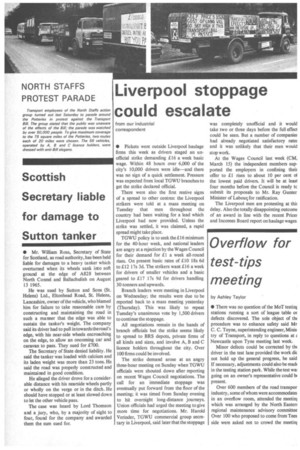Liverpool stoppage could escalate
Page 28

If you've noticed an error in this article please click here to report it so we can fix it.
from our industrial correspondent • Pickets were outside Liverpool haulage firms this week as drivers staged an unofficial strike demanding £16 a week basic wage. Within 48 hours over 6,000 of the city's 10,000 drivers were idle—and there was no sign of a quick settlement. Pressure was expected from local TGWU branches to get the strike declared official There were also the first restive signs of a spread to other centres: the Liverpool strikers were told at a mass meeting on Tuesday that men throughout the country had been waiting for a lead which Liverpool had now provided. Unless the strike was settled, it was claimed, a rapid spread might take place.
TGWU policy is to seek the £16 minimum for the 40-hour week, and national leaders are angry at a rejection by the Wages Council for their demand for El a week all-round rises. On present basic rates of £10 18s 6d to £12 17s 3d. The strikers want £16 a week for drivers of smaller vehicles and a basic geared to £17 17s 9d for drivers handling 30-tonners and upwards.
Branch leaders were meeting in Liverpool on Wednesday; the results were due to be reported back to a mass meeting yesterday (Thursday). This was likely to repeat Tuesday's unanimous vote by 1,500 drivers to continue the stoppage.
All negotiations remain in the hands of branch officials but the strike seems likely to spread to BRS depots, private firms of all kinds and sizes, and involve A, B and C licence holders throughout the city. Over 100 firms could be involved.
The strike demand arose at an angry three-hour meeting on Sunday when TGWU officials were shouted down after reporting on recent Wages Council negotiations. The call for an immediate stoppage was eventually put forward from the floor of the meeting; it was timed from Sunday evening to hit overnight long-distance journeys. Union officials had urged the meeting to give more time for negotiations. Mr_ Harold Verinder, TGWU commercial group secretary in Liverpool, said later that the stoppage was completely unofficial and it would take two or three days before the full effect could be seen. But a number of companies had already negotiated satisfactory rate, and it was unlike13, that their men would stop work.
At the Wages Council last week (CM, March 15) the independent members supported the employers in confining their offer to £I rises to about 10 per cent ol the lowest paid drivers. It will be at least four months before the Council is ready tc submit its proposals to Mr. Ray Owner Minister of Labour, for ratification.
The Liverpool men are protesting at this delay. Also the totally disappointing outcome of an award in line with the recent Price. and Incomes Board report on haulage wages












































































































